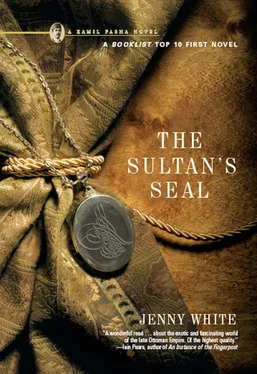Jenny White - The Sultan's seal
Здесь есть возможность читать онлайн «Jenny White - The Sultan's seal» весь текст электронной книги совершенно бесплатно (целиком полную версию без сокращений). В некоторых случаях можно слушать аудио, скачать через торрент в формате fb2 и присутствует краткое содержание. Жанр: Исторический детектив, на английском языке. Описание произведения, (предисловие) а так же отзывы посетителей доступны на портале библиотеки ЛибКат.
- Название:The Sultan's seal
- Автор:
- Жанр:
- Год:неизвестен
- ISBN:нет данных
- Рейтинг книги:5 / 5. Голосов: 1
-
Избранное:Добавить в избранное
- Отзывы:
-
Ваша оценка:
- 100
- 1
- 2
- 3
- 4
- 5
The Sultan's seal: краткое содержание, описание и аннотация
Предлагаем к чтению аннотацию, описание, краткое содержание или предисловие (зависит от того, что написал сам автор книги «The Sultan's seal»). Если вы не нашли необходимую информацию о книге — напишите в комментариях, мы постараемся отыскать её.
The Sultan's seal — читать онлайн бесплатно полную книгу (весь текст) целиком
Ниже представлен текст книги, разбитый по страницам. Система сохранения места последней прочитанной страницы, позволяет с удобством читать онлайн бесплатно книгу «The Sultan's seal», без необходимости каждый раз заново искать на чём Вы остановились. Поставьте закладку, и сможете в любой момент перейти на страницу, на которой закончили чтение.
Интервал:
Закладка:
That evening, Kamil blots the ink on the letter he is trying to write. The words he has written seem to have taken on too much color, lost the dry rustle of truth and factualness that makes them scientific and, thus, to be believed by the recipient, H. G. Reichenbach.
Since the garden party, his thoughts have slipped their accustomed tether and he finds himself dwelling on Sybil’s tapered fingers twined around the stem of the wineglass; the plump mound at the inside of her wrist; the hollow at the base of her neck. He thinks with disquiet, but also a little more sympathy, of his father, who, in his opium dreams, has surrendered to blissful communication with his dead wife. He takes up his pen and continues writing.
Dear Professor Reichenbach,
I write as an amateur botanist, but one with scientific observations that I hope to bring to your esteemed attention. I am in possession of a glorious and most unusual orchidae that to my knowledge has not been described elsewhere. It is a small plant with two roundish, semi-attached tubers and basal leaves with one spike culminating in a single showy flower. The flower is velvety black, with an arched labellum and densely hairy petals. The speculum is divided into two symmetrical halves and is a bright, shining blue, almost phosphorescent. I observed the plant in its habitat over several weeks. The arched labellum attracts male insects that cross-pollinate the flowers, perhaps lured by some volatile chemical compound released from its surface.
I collected this orchid in marshland at the edge of a forest in northwest Anatolia near the Black Sea. I have never seen another, nor does it fit the description of any of the orchidacae in your famous Glossary.
It is but one of many wondrous orchidacae in the Ottoman Empire, some of which I have described in previous letters to you. Many are found only here in Turkish lands; others join us to Europe in a continuous ecology. The tulip, the carnation, the lily, these are everywhere depicted, yet the true treasure of the empire, the orchid, is inexplicably absent.
I most respectfully await your response. If you desire it, I can arrange to have a sketch of the orchid sent to you so that you may inspect it further.
Yours most sincerely,
Kamil Pasha
Magistrate and Fellow Lover of Orchids
This is not his first letter to Professor Reichenbach, but he has not yet received a response.
10
Hamza had been my friend almost as long as I could remember. When Mama and I still lived with Papa on the hill in Nishantashou, he engaged Hamza, his sister’s son, as my tutor. Hamza had graduated from L’École Supérieure in Paris and, thanks to Papa’s influence, was awarded a position as translator at the Foreign Ministry in Istanbul. His family lived in Aleppo, where, Papa told me, his father had been a kadi. Since his father was retired and unable to set Hamza up in his own household, Hamza lived with us as part of our extended family. Every morning, he set off for work dressed in Frankish trousers and the long, slim stambouline jacket fashionable among modern Ottomans. Papa too had long since discarded the traditional long robe and turban for trousers and a dashing red fez.
I watched from behind the wooden lattice that screened the women’s quarters from the street as Papa and Hamza got into the carriage for their trip to the Sublime Porte. I caressed the words “Sublime Porte” in my mouth. I imagined it to be the entrance to the palace, an enormous carved wooden door studded with jewels and guarded by Nubian eunuchs, through which Papa and Hamza entered every day to go to their offices. When I was little, driving by in a carriage, my governess had pointed out the palace gates. They were enormous, of white stone, and set into an endlessly high wall the color of dried blood that rose on both sides of the narrow road. That first time, driving past the gates, I panicked and screamed, imagining that, with so little of the sky visible, the walls had begun to move together and would crush us. I learned that this was the Dolmabahche Palace, the home of Sultan Abdulaziz, not the Old Palace of many gates and pavilions that sat like a jewel box on a promontory at the confluence of the Bosphorus and the Sea of Marmara.
Some years later, when Sultan Abdulhamid had replaced Abdulaziz and I was living with Mama at Chamyeri, Hamza pointed these palaces out to me as we slid past them on the bright water in a caïque. Hamza was escorting Mama and me on a summer picnic trip to the islands at the mouth of the Marmara, our caique propelled by six strong rowers. Even though mother and I were invisible under our feradje cloaks and yashmak veils, the rowers studiously avoided looking toward the stern of the boat where we sat on cushioned benches. Hamza sat beside me, not touching, but so close I felt the heat of his body. The Russians had invaded the empire two months earlier and were slowly making their way toward Istanbul, but on this peerless summer day, the horizon was that of a young girl in love.
The first palaces we passed were ornate white confections, first the smaller Chiraghan Palace, crumbling around Sultan Abdulhamid’s elder brother Murad and his family, who Hamza told me were imprisoned there, then the endless expanse of Dolmabahche right along the water’s edge, wing after wing of ornamented white stone behind enormous white marble archways. I realized it must have been the landward walls of Dolmabahche that had so frightened me, but I did not tell him that, so he would not think me a baby. I was, after all, eleven.
“Sultan Abdulhamid’s family and retainers live and work in Dolmabahche,” Hamza told me, “but the sultan wants privacy and security. He trusts no one, not even members of his own family and staff.” He pointed toward the top of the hill. “So he has built himself a new palace on the hill above the old one.”
I looked up and saw a yellow wall snake through the trees. Looking higher, I caught glimpses of pitch-roofed buildings within the forest. From Nishantashou, I could see the lighted Yildiz Palace fill up the night like a hill of stars. I had always wondered who lived there, but since no one in the household ever looked in its direction, I hadn’t wanted to reveal my ignorance by asking.
Finally, as the boat slipped from the narrow Bosphorus into the open sea, Hamza pointed to the breast of land riding the confluence of the Bosphorus, the Golden Horn, and the Sea of Marmara. The Old Palace on the hill was like the magic land from Hamza’s tales, its turrets and pavilions set like jewels among trees and gardens.
“This is Topkapi Palace, where servants and slaves are sent to live out their days when they are old. And the harems and households of former sultans, and their widows.” He pointed to a door in the enormous red wall that stretched along the entire expanse of the waterfront.
“That’s the only door through which the women can leave again. It’s where the dead are taken out for burial.”
Irritated at Hamza for spoiling my vision with his depressing observations, I responded in a determinedly sprightly voice, “Still, I think it’s a lovely place. I should like to live there.”
Hamza looked at me thoughtfully.
“You shouldn’t wish that, princess. They are not allowed to leave, nor are their children. Sultans fear their brothers and their children. If they’re in line for the throne, they might try to depose the ruler. If they’re not, they’ll scheme to eliminate those in line before them. Even the daughters, should they marry, might be used by their in-laws to meddle in palace affairs. Connections and family links between the royal House of Osman and the rest of the empire are always kept to a minimum. One way to do that is to isolate members of your family. Another way is to kill them.”
Читать дальшеИнтервал:
Закладка:
Похожие книги на «The Sultan's seal»
Представляем Вашему вниманию похожие книги на «The Sultan's seal» списком для выбора. Мы отобрали схожую по названию и смыслу литературу в надежде предоставить читателям больше вариантов отыскать новые, интересные, ещё непрочитанные произведения.
Обсуждение, отзывы о книге «The Sultan's seal» и просто собственные мнения читателей. Оставьте ваши комментарии, напишите, что Вы думаете о произведении, его смысле или главных героях. Укажите что конкретно понравилось, а что нет, и почему Вы так считаете.












